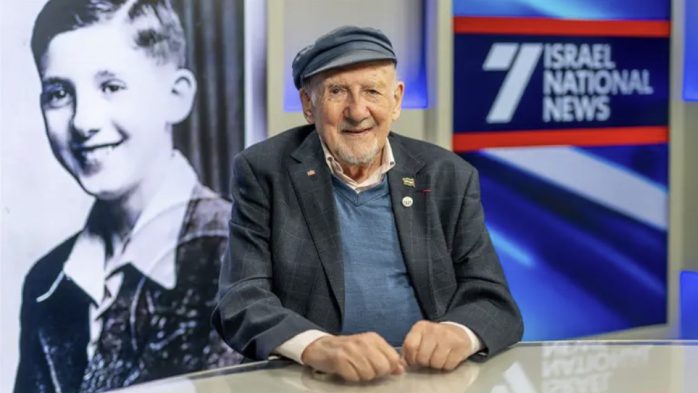Walter Bingham reflects on the 81st anniversary of D-Day and the 80th anniversary of V-E Day, drawing parallels between past and present struggles against tyranny and antisemitism.
Walter Bingham draws parallels between past and present struggles against tyranny and antisemitism.
He shares insights into the vital work of medical clowns in Israeli hospitals, explores the complexities of the current travel landscape, and delves into a critical examination of the internet’s impact on society. The broadcast concludes abruptly with Bingham preparing for a potential attack, highlighting the ongoing state of emergency in Israel.
A Historical Perspective: Echoes of War
Bingham, a proud participant in the Allied efforts to free the world from Nazi tyranny, opens his program by commemorating significant historical milestones. He notes the 81st anniversary of D-Day, the Allied invasion of Nazi-occupied Europe, which marked “the beginning of the end” for the Hitler regime. Just a month prior, the world also observed 80 years since the end of World War II in Europe.
He expresses concern that the “insane evil” of antisemitism, which led to the Holocaust, is again plaguing the world. However, he emphasizes a crucial difference today: “We have a strong state of Israel that will smite our enemies as the Jewish people have done through the ages.” He shares his personal experience of commemorating V-E Day at the Chaim Herzog Museum of Jewish Soldiers of World War II in Latrun, Israel, a testament to the one and a half million Jewish men and women who served in the Allied forces, 250,000 of whom made the ultimate sacrifice. This relatively new museum is “sorely missing” no more and is a highly recommended destination.
The Healing Power of Laughter: Medical Clowns in Israel
Shifting focus to a lighter, yet equally profound, topic, Bingham introduces listeners to the world of medical clowns. He describes hospitalization as an undesirable experience, where the constant presence of illness, fear of infection, and sounds of pain can hinder recovery. In this challenging environment, laughter emerges as “the best healing agent.”
Medical clowns, also known as therapeutic clowns or clown doctors, are trained professional performers who use improvisation, physical comedy, magic, puppetry, and music to bring joy to patients. Israel, Bingham notes, boasts a robust medical clowning scene with multiple organizations. He specifically highlights “Simchat HaLev” (Joy of the Heart), a foundation established by Sophie Meyer in 2000, which provides professional training for aspiring clowns.
Jeff Gordon, a veteran clown and senior lecturer at Simchat HaLev, explains that medical clowning, while originating in America, is particularly well-developed in Israel and has generated significant research. He emphasizes that sensitivity and a special personality are key to successful medical clowning. Most trainees come from non-theatrical backgrounds and undergo a rigorous six-month program focused on understanding the “language of the theatre and then of the clowns,” with initial hospital visits only after comprehensive training.
Sara Nachshon, a recent graduate of the Simchat HaLev program, shares her journey into medical clowning. Always a natural storyteller and humorist, she discovered her calling at age 60 after seeing a Facebook advertisement for the course. Working at Jerusalem’s Shaare Zedek Hospital, Cara describes the work as “physically very demanding” but deeply rewarding. She adapts her approach to each patient and situation, noting that “the best healing agent is laughter.”
Jeff Gordon concludes the segment by expressing his wish for more people to pursue medical clowning, emphasizing the “great need to support patients in their healing.”
The Double-Edged Sword of the Internet
Bingham embarks on a critical examination of the internet, an “indispensable tool” that has become the “world’s method of communication.” While initially hailed as a promoter of free speech and a “life-changing revolution” comparable to the telephone, he argues that its “negative side is plainly visible in the field of social interaction.”
He laments the replacement of genuine conversation by smartphones, citing observations at weddings where guests revert to their devices. He also notes the decline of quality family time, replaced by individual digital games. Bingham highlights the detrimental impact of parents being constantly glued to their phones, setting a poor example for young children. Furthermore, he criticizes the societal dangers posed by immoral websites, the promotion of knife crime, and the emergence of the “dark web.”
He expresses concern about the politicization of social media platforms, which he believes often incite “disorderly behavior and antisemitism.” He pessimistically concludes that “all our technical know-how cannot put that evil genie back into the bottle.” Looking ahead, he predicts that **Artificial Intelligence (AI)** will be “the next social revolution and be far more damaging than anything we can imagine.” He views the strong promotion of AI as a “sacrilege” and a “chillul hashem” (desecration of God’s name), as it attempts to “emulate our Creator.”
He draws a parallel between AI proponents and those who undermine democratic norms, specifically criticizing elements in Israel who seek to transform the country into a secular state devoid of Torah values. Bingham asserts that such actions are “counterproductive to the existence of the State of Israel,” and the government will remain resolute in its plan for “sovereignty from the river to the sea.”





